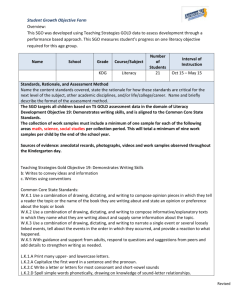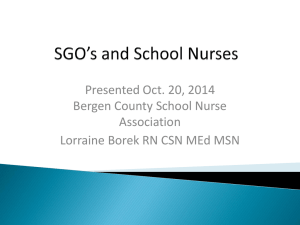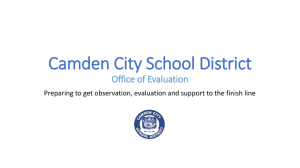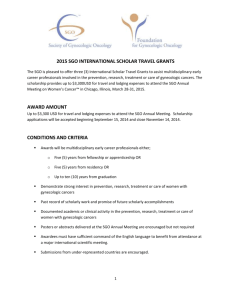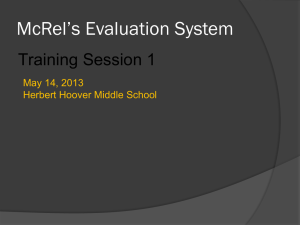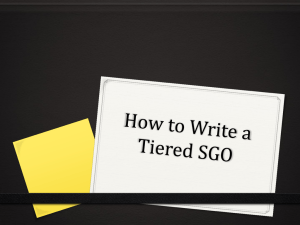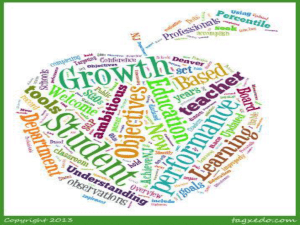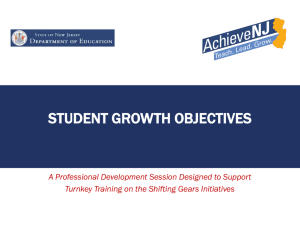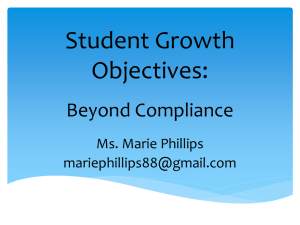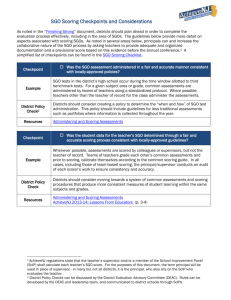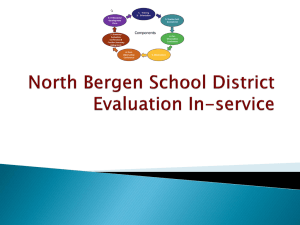Excellent Educators for New Jersey (EE4NJ): November Update
advertisement
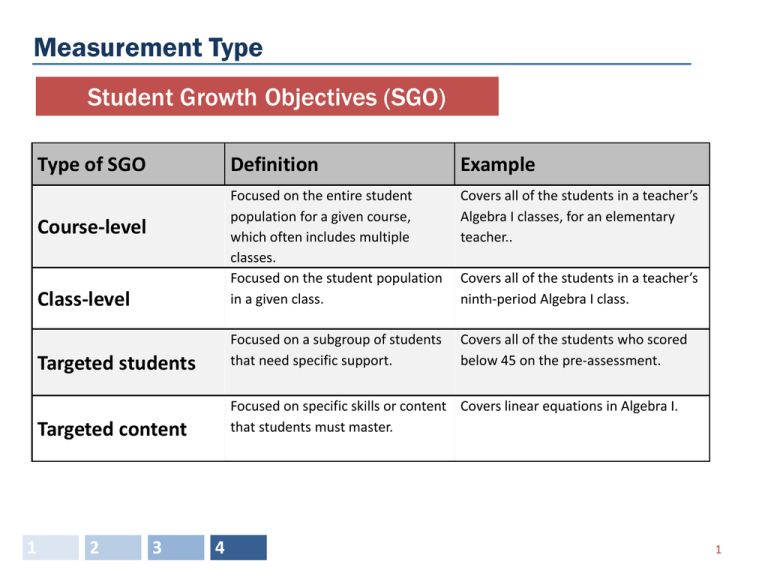
Measurement Type Student Growth Objectives (SGO) Type of SGO Definition Example Covers all of the students in a teacher’s Algebra I classes, for an elementary teacher.. Class-level Focused on the entire student population for a given course, which often includes multiple classes. Focused on the student population in a given class. Targeted students Focused on a subgroup of students that need specific support. Covers all of the students who scored below 45 on the pre-assessment. Targeted content Focused on specific skills or content Covers linear equations in Algebra I. that students must master. Course-level 1 2 3 4 Covers all of the students in a teacher’s ninth-period Algebra I class. 1 Types and Examples of SGOs Type of SGO General Definition Examples (from Algebra I class) Focused on the teacher’s entire Covers all students in a teacher’s student population for a given course. Algebra I classes and aligned Includes large proportion of comprehensively with course curriculum standards. standards. General tiered goal Same as above, but with student goals tiered by preparation levels Same as above, but with student goals tiered by preparation levels. Specific — student group Focused on a subgroup of students that need specific support. Covers a group of students that scored below 45 percent on the pre-test. Specific — content/skill Focused on specific skills or content that students must master. Covers New Jersey Common Core State Standards related to quadratic functions and modeling. Practice SGO TEACHERS: SG0 SGP Summative 2 SGOs: Some Possible Assessment Types Portfolio Assessments Traditional Assessments • • National/State tests (e.g., Advanced Placement exams, DIBELS, EOC Biology) District, school and departmental tests (e.g., final exams, benchmark tests) • • • • • Practice SGO TEACHERS: SG0 SGP Gold® (pre-K, K) Writing and reflection samples (ELA) Laboratory research notebook (sciences) Student project-based assessments (all subjects) Portfolio of student work (art, photography, graphic design, etc.) Performance Assessment • • • • • Lab Practicum (sciences) Sight reading performance (music) Dramatic performance (drama) Skills demonstration (physical education) Persuasive speech (public speaking) Summative 3 SGO Components: Student Growth Objectives (SGO) Assessment • Administer department-developed pre-test aligned with 2009 CCCS. Baseline Data • Determine general preparation level . • Group students into three categories (low, medium, high). • Determine specific areas of deficit . Growth Targets • General – set a target for all students at each preparation level covering all content. Specific – set a target for all students to grow in a particular content standard. • 1 2 3 4 4 Student Growth Objectives (SGO) Teacher: 1 Subject: Sections: General Objective Grade: Number of students: Preparation Level Based on Pre-Test Score Number of Students SGO Based on Predicted Achievement on Post-Test Score Low (0-45%) 21 70% or above Medium (46-69%) 54 80% or above High (70-100%) 7 90% or above 2 3 4 5 TEACHERS The SGO Process Step 1: Choose or develop a quality assessment aligned to state standards KEY Teachers, supervisors meet to discuss and set SGO w/ principal’s approval Recommended steps for setting a good SGO Official SGO process in regulations Teachers, supervisors meet to discuss SGOs and other measures Step 4: Track progress, refine instruction September Step 2: Determine students’ starting points Practice SGO TEACHERS: SG0 By Nov. 15* Step 3: Set ambitious and feasible student growth objectives SGP Summative By Feb. 15 Adjustments to SGOs can be made with approval By end of school year Step 5: Review results and score *For 2013–14 only. In subsequent years, SGOs must be set by Oct. 15. 6 Student Growth Objectives (SGO) Student Preparation Level General Objective Target Rating based on number of students reaching target score SGO Score Assessing Outcomes – General % # stu Highly Effective Effective Partially Effective Ineffective Low 70 21 >17 11-17 5-10 <5 Medium 80 54 >45 26-45 10-26 <10 High 90 7 >6 5-6 2-4 <2 4 3 2 Score 3 1 2 3 4 7 Tiered General SGO: Physics 1 75% students will meet their designated target scores on the Physics 1 post-assessment Goal Preparedness Group Low Medium High Measuring Progress Number of Students in Each Group 36/65 21/65 8/65 For a teacher to earn a rating of ... 4 85% or more students in the tier met goal Low Medium Target Score on Post-Assessment (%) 70 80 90 3 75% or more students in the tier met goal 2 1 65% or more students in the tier met the goal Less than 65% of students in the tier met goal High Practice SGO TEACHERS: SG0 SGP Summative 8 Specific Goal: Targeted Biology Standard Specific Goal: Targeted Standard The average student score on questions related to Standard 5.1.12.B (scientific thinking and design) will increase from 40% to 80% on final exam. For a teacher to earn a rating of ... Measuring Progress Practice SGO TEACHERS: SG0 4 90% or more students met goal SGP 3 80% or more students met goal 2 70% or more students met the goal 1 Less than 70% of students met goal Summative 9 Specific Goal: Targeted Students (8th-Grade LAL) Specific Goal: Targeted students 6/8 students who scored in the low range on the preassessment will increase 10 words per minute over their baseline score on the Oral Reading Fluency Assessment. For a teacher to earn a rating of ... Measuring Progress Practice SGO TEACHERS: SG0 4 7-8 students met goal. SGP 3 5-6 students met goal. 2 3-4 students met the goal. 1 0-2 of students met goal. Summative 10 Teachers’ Summative Ratings Component Raw Score Weighted Score Weight Teacher Practice 3.0 x 50% 1.5 Student Growth Percentile 2.2 x 35% .77 Student Growth Objective 3.0 x 15% .45 Sum of the Weighted Scores 2.72 2.72 This is a sample scale. The NJDOE will determine the actual scale prior to September 2013. Practice TEACHERS SGO Ineffective 1.0 Points SGP Partially Effective 1.75 Points Highly Effective Effective 2.5 Points 3.5 Points 4.0 Points Summative 11 Website and Contact Information Website: http://www.state.nj.us/education/evaluation Contact information: – For general questions, please email educatorevaluation@doe.state.nj.us – Phone: 609-777-3788 12
